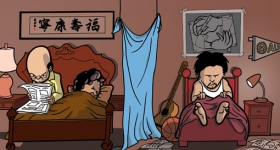John Kim is somewhat of a unicorn. He is an uber-attractive, Asian American male who not only has a high emotional IQ and is in touch with his feelings; he likes to talk about them, a lot. So much, in fact, that he's made a career of it.
Known as The Angry Therapist, he's a unicorn in the mental health community as well, and has taken his life experience and unique approach to therapy to help people across the world via his blog, his self-published books, his weekly radio show, his YouTube channel, and webcam sessions from his living room. His unconventional techniques have found a home particularly among the Gen Y set.
I first found my way to him via his Tumblr, as many of my friends had been reblogging his posts: a mix of Psych 101, a pep talk from a big brother, and a chat over coffee with a close friend. There was something decidedly un-therapist-y about his writing style -- he talked about his own life, was honest about his divorce and his feelings (sometimes of failure and inadequacy), and he was vulnerable. He had sometimes even talked about his childhood, or posted snippets of conversations with his Korean parents, who lovingly poked fun at his career and didn't really get what he did for a living.
Nearly all other therapists I'd seen in my lifetime (at least half a dozen in my 29 years) had a brick wall around them; they were unrelatable, cold and unhuman, and often acted like disembodied heads. With them, I felt less like a person and more like a patient, or worse, a specimen. But here was this dude putting his humanity front and center. He didn't have a leather couch, and he didn't sit back quietly and pretend to take copious notes during sessions, and for that, I trusted him even more.
He's also honest and upfront about his journey as a therapist. A former screenwriter, John (or Angry, as many of his readers call him) found his calling while in therapy for himself. "I went into therapy because I was seeing a therapist myself, because my marriage was falling apart. I was married to an actress and she was doing really well and I was a screenwriter and I wasn't doing very well, and the therapist was asking me what I wanted to do if that didn't work out. I said, 'I'd like to do what you're doing.'"
It seemed like a logical move for him, as the guy his friends always came to for advice, but the career change required him to go back to grad school, which was petrifying. "I breakdanced, skateboarded, and was a straight C student. I hated school, and I only graduated college because I studied screenwriting, cause I was okay at it. Going back to school, I was petrified, and I was trying to pay for it myself, but because I loved psychology so much, I got straight A's for the first time in my life."
His passion for helping others helped him through school, but he relied primarily on his own life experiences to carve out his career. Being transparent and insisting on being true to himself, even in his professional life and against the advice of his mentors, has so far only worked in his favor. He notes, "When I was going to grad school, everyone was telling me to learn Spanish. [It was] the biggest advantage you could have. I thought, why? [...] I'm Korean, I'm already bilingual. [...] I was in my own therapist's room and he was like, 'How many Korean therapists do you know?' And I said 'None, I've never met one Korean therapist in my life.' And he goes, 'Okay, well, that makes you a high commodity.'"
Going with his gut and working with his own knowledge even landed him his first gig out of grad school at Asian American Drug Abuse Program. After speaking to his therapist, he says, "I went home that day and I googled 'Asian American treatment centers' and I landed on a website called AADAP and it's one of the biggest nonprofit Asian American drug abuse programs in Los Angeles and I literally made one phone call. I said 'Look, I'm bilingual, I speak Korean, I'm looking for work in mental health,' and they pretty much hired me on the spot because they said they rarely came across a male, Korean, bilingual therapist."
He was placed in a residential program working with primarily Asian American teens with alcohol and drug abuse problems. From there, he ran a family support group and noticed that many of these kids had fathers who were alcoholics and were absent or often abusive. He found a sweet spot where he was able to make a difference in their lives: "I was young enough to get the teenagers, but old enough to communicate with their parents. I grew up taking my shoes off in the house and eating kim chi but I also grew up breakdancing."
And he's continued to carve out his own career and practice, helping people out in exactly the way that suits him. He admits that his parents still don't entirely get his job: "They keep telling me to go get a 9-5 and work at a hospital and it's like, I'm trying to do something out of the box and different, and they don't understand it. They don't understand that I'm seeing people on the computer. They just don't get it. I've always been a black sheep with my parents, I've always taken the untraditional, they're used to it by now."
And it's hard to deny his success. He's reached hundreds of thousands of people through his blog and Youtube videos. He's published three books on Amazon and given away countless copies of his first book, Transparency. Since taking his first online clients in 2009, he's amassed over 100 regular clients.
He offers individual webcam sessions and conducts group webcam sessions on Google Hangouts. He also moderates a virtual therapeutic community, which is free to join. More details can be found here.










Comments